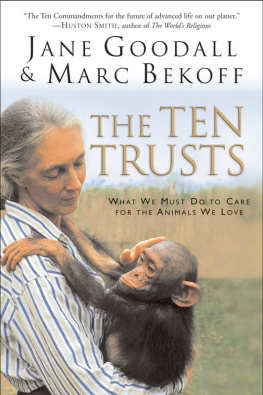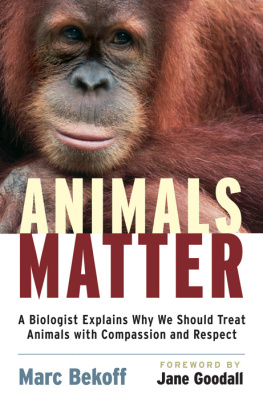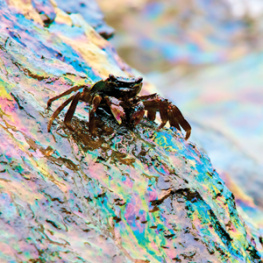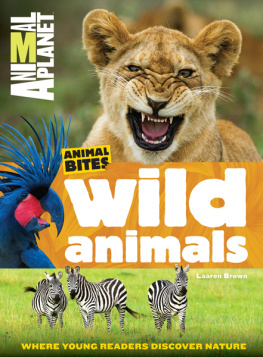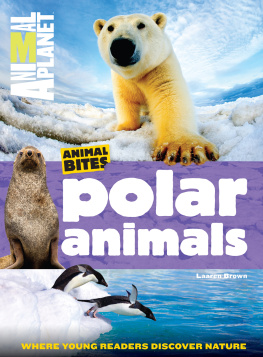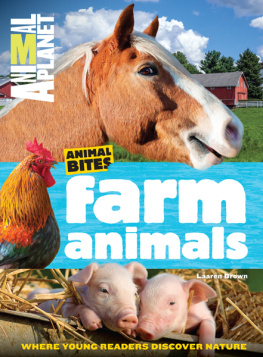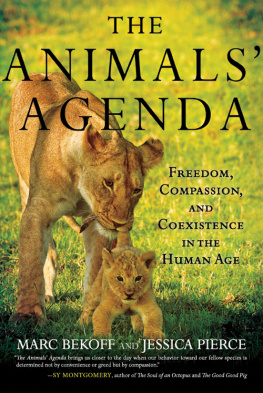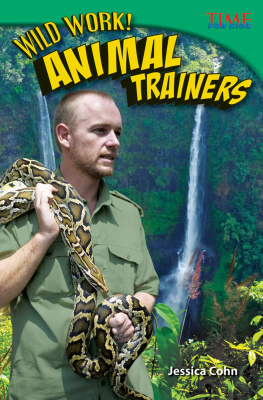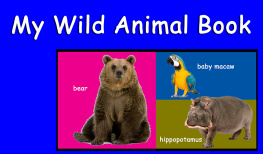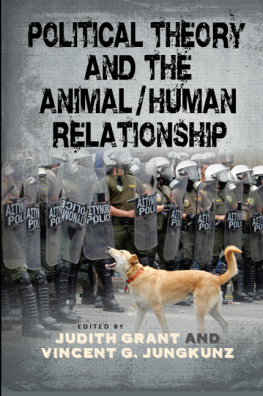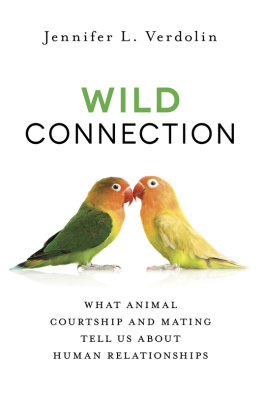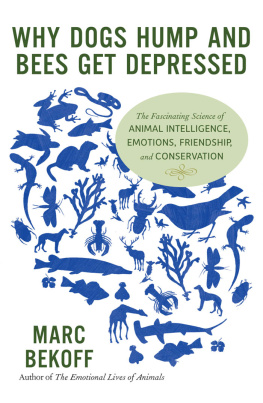Raised by
Animals
The Surprising New Science of Animal Family Dynamics
JENNIFER L. VERDOLIN
FOREWORD BY MARC BEKOFF

Raised by Animals: The Surprising New Science of Animal Family Dynamics
Copyright 2017 by Jennifer L. Verdolin
Foreword 2017 by Marc Bekoff
All rights reserved. Except for brief passages quoted in newspaper, magazine, radio, television, or online reviews, no portion of this book may be reproduced, distributed, or transmitted in any form or by any means, electronic or mechanical, including photocopying, recording, or information storage or retrieval system, without the prior written permission of the publisher.
The Experiment, LLC
220 East 23rd Street, Suite 301, New York, NY 10010-4674
theexperimentpublishing.com
This book is sold with the understanding that neither the author nor the publisher is engaged in rendering professional parenting advice to individual readers. It is not intended as a substitute for consultation with a health professional. Names and identifying details have been changed to protect the privacy of individuals.
Many of the designations used by manufacturers and sellers to distinguish their products are claimed as trademarks. Where those designations appear in this book and The Experiment was aware of a trademark claim, the designations have been capitalized.
The Experiments books are available at special discounts when purchased in bulk for premiums and sales promotions as well as for fundraising or educational use. For details, contact us at .
Library of Congress Cataloging-in-Publication Data
Names: Verdolin, Jennifer L., author.
Title: Raised by animals : the surprising new science of animal family dynamics / Jennifer L. Verdolin ; foreword by Marc Bekoff.
Description: New York : The Experiment, 2017.
Identifiers: LCCN 2016046676
Subjects: LCSH: Parental behavior in animals. | Parenting. | Reproduction.
Classification: LCC QL762 .V47 2017 | DDC 591.56/3--dc23
LC record available at https://lccn.loc.gov/2016046676
Ebook ISBN 978-1-61519-345-5
Cover and text design by Sarah Schneider
Cover photograph Suzi Eszterhas | Nature Picture Library
Wild Animal Engravings Graphic Goods | Creative Market
Leaves Vector Hut | Creative Market
Manufactured in the United States of America
Distributed by Workman Publishing Company, Inc.
Distributed simultaneously in Canada by Thomas Allen and Son Ltd.
To Ramie,
thank you for being my family
CONTENTS
Foreword by
Marc Bekoff
Nonhuman animals, we know now, are not so different from us. They grieve, they empathize, they get angry, and they experience joy. They also make decisions based on a sense of fairness and of right and wrong. I have made it my lifes work to investigate the complexity of animals inner livesrich with intelligence, social fluency, and emotional depthand to raise our consciousness so that we will change the way we view, appreciate, understand, and treat them. And, as cutting-edge comparative cognitive and behavioral research continues to reveal new ways weve long underestimated them, the imperative only grows for all of us to treat other animals with the empathy and compassion they truly deserve.
The penetrating and evocative science in the pages that follow shows us how far weve come in our understanding of animals. It also shows beyond doubt that a more sympathetic view of other speciesfrom rats to birds, cheetahs to prairie dogsis just as beneficial for us as it is for other animals. We have much to learn from them.
Consider, for example, the way animal parents teach their children the value of sharing. Many human parents wonder whether sharing can be taught, or whether they should let nature run its course and leave their children to decide for themselves how to cooperate with their peers. But if such parents were to turn their attention to the way parenting is actually practiced in nature, theyd see that the natural way is anything but hands-off. Galpagos fur seal mothers, for example, are quick to intervene to encourage cooperative behavior among their pups. When an older brother or sister pesters or attacks a younger sibling, mothers passionately defend their youngest and actively discourage fighting. Natural parenting doesnt imply coldhearted instinct. Rather, its based on principles of empathy and cooperation that we would do well to emulate.
Galpagos fur seals only scratch the surface; as Raised by Animals makes clear, there are many lessons to be learned from animals, if were willing to overcome our biases against them. Furthermore, cultivating a greater sense of understanding and acceptance of animal parenting also encourages us to cast off the damaging biases we hold against members of our own species. Anyone who doubts the ability of same-sex partners to raise healthy children would do well to study Laysan albatrosses, many of whom very successfully grow up with two mothers.
Closely investigating animal behavior also reveals how our attempts at trying to preserve a sense of human exceptionalism can be not only groundlessly arrogant, but counterproductive. As you will read in greater detail, anthropologist and primatologist Dr. Sarah Hrdy points to evidence that, while nearly half of all primate species, not to mention most human cultures throughout history, have engaged in some form of cooperative parental care, contemporary Western society continues to hold dear the notion of a traditional family unit, with one mom and one dad raising their children by themselves. Once again, wed be wise to look to the animals around us for inspiration as to how to be more supportive, and not so unduly taxed and stressed.
Accepting that other animals are multifaceted, thinking, feeling, reasoning beings is better for them, and its also better for us. Its time we all learned to take a much closer look at how other animals navigate the complexities of parentingI promise youll soon see them, as I do, as fascinating individuals deserving of our love, respect, and attention.
Marc Bekoff
Boulder, Colorado
December 2016
Marc Bekoff , P h D, is professor emeritus of ecology and evolutionary biology at the University of Colorado, Boulder, and cofounder with Jane Goodall of Ethologists for the Ethical Treatment of Animals. He has won many awards for his scientific research, including the Exemplar Award from the Animal Behavior Society and a Guggenheim Fellowship. Marc has published more than a thousand essays and thirty books, and has edited three encyclopedias.
CHAPTER 1
Its All Relative

When I think of parenting, I think of Oma, my grandmother. When I would come home from school, Oma was there. When I got banged up playing tag football, fell out of the tree, or held out muddy hands to share my latest slimy creature, Oma was there. No matter what I was into or up to, Oma loved me warmly and unconditionally. She taught me gin rummy, smoked like a chimney, and drank coffee in lieu of water. Like a benevolent dragon, she would blow smoke out of her nose to entertain me. We were two peas in a pod. And still now, so many years later, thin German pancakes slathered with warm butter and sprinkled with cinnamon sugar arouse a yearning for her. That and a Dixie cup full of M&Ms.
Why M&Ms? Every dayevery single dayshe would dispense a small portion of M&Ms into a cup for me after school. Of course, this meager portion was never enough. I knew where she kept them hidden (in the top drawer of her dresser) and I would sneak into her room and refill my cup. I was convinced that I was clever and sneaky, but now Im pretty sure Oma knew what I was up to. For some, the smell of cookies baking, or other everyday moments, encapsulate childhood and evoke memories of home. They say home is where the heart is, and Oma was my home.
Next page

